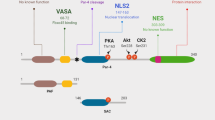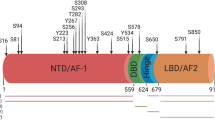Abstract
The 26S proteasome is a ubiquitin-dependent proteolytic system that has been implicated in the regulation of cell cycle progression and apoptosis. We investigated the effects of the proteasome inhibitors MG115 and PSI alone or in combination with different concentrations of the antiandrogen hydroxyflutamide on the cellular proliferation, apoptosis and viability of 10 prostatic adenocarcinoma cell cultures. Treatment with both proteasome inhibitors resulted in apoptosis induction, whereas the combinations with hydroxyflutamide generally did not, with the exception of MG115 combined with 10−7 M hydroxyflutamide. MG115 caused a significant decrease in cellular proliferation, as did the combinations of both proteasome inhibitors with hydroxyflutamide, whereas hydroxyflutamide alone was only effective at a concentration of 10−5 M. Cellular viability was significantly reduced when both proteasome inhibitors were combined with 10−5 M hydroxyflutamide. Although the results varied among different cell lines, we conclude that proteasome inhibitors are able to induce apoptosis and reduce cellular proliferation. They might prove effective as antineoplastic substances in prostatic adenocarcinoma alone or in combination with antiandrogens.
This is a preview of subscription content, access via your institution
Access options
Subscribe to this journal
Receive 4 print issues and online access
$259.00 per year
only $64.75 per issue
Buy this article
- Purchase on Springer Link
- Instant access to full article PDF
Prices may be subject to local taxes which are calculated during checkout


Similar content being viewed by others
References
Ciechanover A . The ubiquitin–proteasome proteolytic pathway. Cell 79; 1994: 13–21.
Spataro V, Norbury C, Harris AL . The ubiquitin–proteasome pathway in cancer. Br J Cancer 77; 1998: 448–455.
Williams SA, McConkey DJ . The proteasome inhibitor bortezomib stabilizes a novel active form of p53 in human LNCaP-Pro5 prostate cancer cell. Cancer Res 2003; 63: 7338–7344.
Maki CG, Huibregtse JM, Howley PM . In vivo ubiquitination and proteasome-mediated degradation of p53. Cancer Res 1996; 56: 2649–2654.
Pagano M et al. Role of the ubiquitin–proteasome pathway in regulating abundance of the cyclin-dependent kinase inhibitor p27. Science 1995; 269: 682–685.
Glotzer M, Murray AW, Kirschner MW . Cyclin is degraded by the ubiquitin pathway. Nature 1991; 349: 132–138.
Grimm LM, Osborne BA . Apoptosis and the proteasome. Results Probl Cell Differ 1999; 23: 209–228.
Lopes UG, Erhardt P, Yao R, Cooper GM . p53-dependent induction of apoptosis by proteasome inhibitors. J Biol Chem 1997; 272: 12893–12896.
McDade TP, Perugini RA, Vittimberga FJ, Callery MP . Ubiquitin–proteasome inhibition enhances apoptosis of human pancreatic cancer cells. Surgery 1999; 126: 371–377.
Chandra J et al. Proteasome inhibitors induce apoptosis in glucocorticoid-resistant chronic lymphocytic leukemic lymphocytes. Blood 1998; 92: 4220–4229.
Herrmann JL et al. Prostate carcinoma cell death resulting from inhibition of proteasome activity is independent of functional bcl-2 and p53. Oncogene 1998; 17: 2889–2899.
Frankel A et al. Lack of multicellular drug resistance observed in human ovarian and prostate carcinoma treated with the proteasome inhibitor PS-341. Clin Cancer Res 2000; 6: 3719–3728.
Zwergel T et al. A new serial transfer explant cell culture system for human prostatic cancer tissues preventing selection toward diploid cells. Cancer Genet Cytogenet 1998; 101: 16–23.
Adams J et al. Proteasome inhibitors:a novel class of potent and effective antitumor agents. Cancer Res 1999; 59: 2615–2622.
Grimm LM et al. Proteasomes play an essential role in thymocyte apoptosis. EMBO J 1996; 15: 3835–3844.
Sadoul R et al. Involvement of the proteasome in the programmed cell death of NGF-deprived sympathetic neurons. EMBO J 1996; 15: 3845–3852.
Tonomura N et al. Glucocorticoid-induced apoptosis of thymocytes: requirement of proteasome-dependent mitochondrial activity. J Immunol. 2003; 170: 2469–2478.
Shinohara K et al. Apoptosis induction resulting from proteasome inhibition. Biochem J 1996; 317: 385–388.
Wilding G, Chen M, Gelmann EP . Aberrant response in vitro of hormone-responsive prostate cancer cells to antiandrogens. Prostate 1989; 14: 103–115.
Veldscholte J, Berrevoets CA, Mulder E . Studies on the human prostatic cancer cell line LNCaP. J Steroid Biochem Mol Biol 1994; 49: 341–346.
Veldscholte J, Berrevoets CA, Mulder E . Studies on the human prostatic cancer cell line LNCaP. J Steroid Biochem Mol Biol 1994; 49: 341–346.
An J, Sun YP, Adams J, Fisher M, Belldegrun A, Rettig MB . Drug interactions between the proteasome inhibitor bortezomib and cytotoxic chemotherapy, tumor necrosis factor (TNF) alpha and TNF-realted apoptosis-inducing ligand in prostate cancer. Clin Res 2003; 9: 4537–4545.
Adams J . Development of the proteasome inhibitor PS-341. Oncologist 2002; 7: 9–16.
Ficazzola MA et al. Antiproliferative B cell translocation gene 2 protein is down-regulated post-transcriptionally as an early event in prostate carcinogenesis. Carcinogenesis 2001; 22: 1271–1279.
Lin R, Wang TT, Miller Jr WH, White JH . Inhibition of F-Box protein p45(SKP2) expression and stabilization of cyclin-dependent kinase inhibitor p27(KIP1) in vitamin D analog-treated cancer cells. Endocrinology 2003; 144: 749–753.
Acknowledgements
This work was supported by the Else Kröner Foundation, Germany (Zw – 2001).
Author information
Authors and Affiliations
Corresponding author
Rights and permissions
About this article
Cite this article
Zwergel, T., Tahmatzopoulos, A., Wullich, B. et al. Proteasome inhibitors and their combination with antiandrogens: effects on apoptosis, cellular proliferation and viability of prostatic adenocarcinoma cell cultures. Prostate Cancer Prostatic Dis 7, 138–143 (2004). https://doi.org/10.1038/sj.pcan.4500709
Received:
Revised:
Accepted:
Published:
Issue Date:
DOI: https://doi.org/10.1038/sj.pcan.4500709
Keywords
This article is cited by
-
The crosstalk between ubiquitination and endocrine therapy
Journal of Molecular Medicine (2023)
-
Silencing of PSMC2 inhibits development and metastasis of prostate cancer through regulating proliferation, apoptosis and migration
Cancer Cell International (2021)
-
High expression of PSMC2 promotes gallbladder cancer through regulation of GNG4 and predicts poor prognosis
Oncogenesis (2021)



